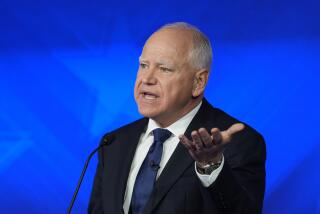Exiled Chinese Dissident Has Hopes for Reforms
- Share via
It’s hard to believe Wang Dan was a political prisoner in China just over one month ago.
Seemingly relaxed, in control and already well-adapted to life in the United States, Wang calmly answered questions from reporters before speaking to a largely Chinese American crowd of 250 in Rosemead on Saturday.
“I’m going to Harvard,” Wang said through an interpreter while smiling broadly. “I just heard this morning that they’ve accepted my application.”
Until recently, the student who helped lead the 1989 Tiananmen Square protests was serving what was supposed to be an 11-year sentence for plotting against the Chinese government. After intense pressure from human rights groups and the U.S. government, China released Wang for “medical” reasons, but exiled him.
Wang has acknowledged that his power to ferment democracy in China is weakened by his inability to return there. But as if to compensate, he has enthusiastically embraced American audiences, sharing his experiences with dozens of groups.
Filling the pews at the First Evangelical Church, where Wang spoke, were families, intellectuals, children and grandparents.
“Wang’s experience appeals to everyone who is Chinese,” said 28-year-old Kim Xiao. “I have family in China, most people here have family in China, so the interest is very strong.”
Xiao remembers with a shudder the Tiananmen Square protests and subsequent crackdown.
“I remember thinking the students were very brave. Wang reminds me of that student who stood in front of the tank,” Xiao said. “He had to know he would go to jail, but he kept speaking out anyway.”
Wang remembers with regret the events at Tiananmen, where hundreds, perhaps thousands, died at the hands of the Chinese military. Student leaders never intended the demonstration to provoke violence, he said.
But he remains convinced that the Chinese government cannot squash democratic reforms forever.
In the meantime, Wang hopes to return to the academic life he left for the sake of politics. That training, he believes, is necessary for him to significantly influence events in China. “I love my country very much,” he said. “All I learn and all I do is for China.”
More to Read
Sign up for Essential California
The most important California stories and recommendations in your inbox every morning.
You may occasionally receive promotional content from the Los Angeles Times.













